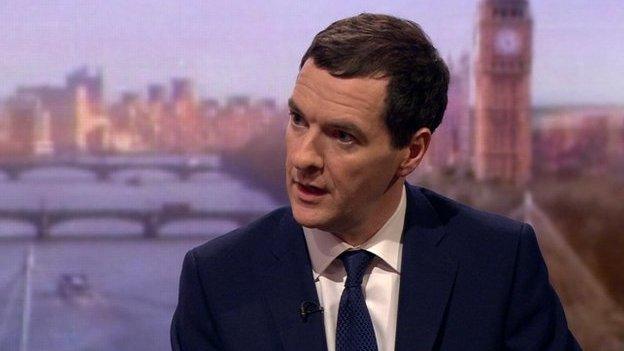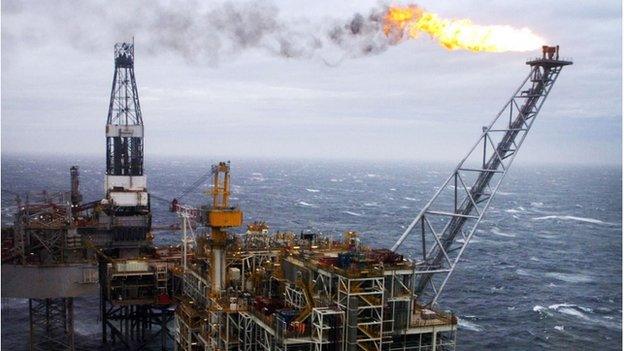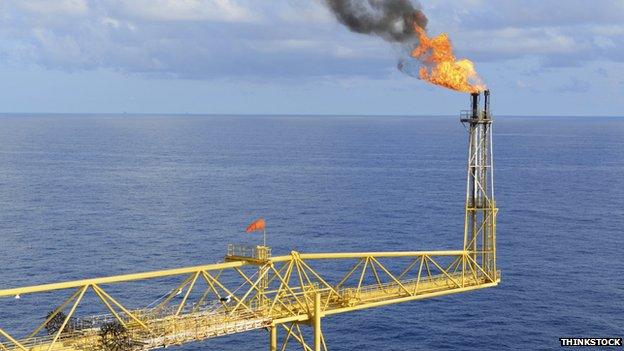Osborne's choice: Oil industry at the crossroads
- Published

In his Autumn Statement 2014, George Osborne gets to set out the battlefield for the election next May. It's not the battlefield he would wish. The public finance numbers look grim, and point to tight budget constraints on the next Westminster government.
That reflects poor income tax receipts, but also a sharp decline in what the Treasury can expect to rake in from offshore oil and gas. With a barrel of Brent crude trading around $72, down for five successive months from $115, there's a lot less profit on which to levy tax.
It's also a lot less attractive to invest, with energy prices returning to volatility, after an unusually long period of stability. And it's reported that some big banks are looking nervously at some very big loans they've made for energy developments.
Volatility is nothing new. Brent crude has sunk to low levels in each of the decades since the Brent field, off Aberdeen, started production. What marks out this time as different is that the UK's offshore industry is at a crossroads.
It's been warning that it either invests now, or it pulls out of many older fields. And if it pulls out as equipment ages, it looks more likely to scrap platforms than to mothball them.
Culture change
So the significance of this Autumn Statement may also be that it marks a sea-change in Britain's relationship with its oil and gas industry.
If, as expected, there is to be a new tax regime set out for the North Sea and those exploring in the Atlantic, we are looking at an end to big windfall taxes, and a focus instead on getting the incentives right for new investment in exploration and production, and collaboration between producers.
The route map for this was set out by Aberdeen industry's grandee Sir Ian Wood. Commissioned in June 2013 to investigate fast-falling production and exploration, he reported last February that the industry was failing to co-operate as it should, and that a culture change would be necessary.
Since then, industry data has confirmed that the price of production per barrel has risen by 62% in only two years, with unexpected shut-downs affecting output. The investment required per barrel has more than trebled in ten years.
The UK's Department of Energy and Climate Change (this is not a subject on which climate change has much of a say), responded to Sir Ian's review with agreement that there should be a new regulator in charge of "effective stewardship".
The Oil and Gas Authority, to be headquartered in Aberdeen, is replacing regulation by DECC officials (about which Sir Ian was uncomplimentary).

It is to have more powers and more brain power to knock industry heads together in the cause of Maximising Economic Recovery (MER). Those that don't sign up for maximising output, in favour of abandoning fields early, may find they lose their licences.
Note that this is not about maximising tax take, but about getting the most out from the seabed, the most out of the industry, and the smallest possible energy import bill.
Taps turned off
Sir Ian said effective implementation of his plan could make the difference of extracting a further three to four billion barrels of oil (or gas equivalent) over the next 20 years, within the range of 11 to 24 billion barrels reckoned to be possible. (For comparison, around 42 billion barrels have already been extracted.) That difference looked like £200bn worth, at the time the Wood Review was published.
But the economics of the industry have changed a lot since that estimate. The industry body, Oil & Gas UK, warned last month that a fall in the price of Brent crude to $80 would put a third of investment plans on hold. That was before it did precisely that, and went further. We're already seeing the early stages of investment plans frosting up, and can expect to see more.

So the pressure on George Osborne to deliver a generous dollop of tax reform is two-fold - a maturing offshore 'basin' and a falling price. Time is not on his side.
Oil & Gas UK is asking for a reversal of his £2bn per year tax raid on the industry in his 2011 Budget. That was when the Chancellor boosted the Supplementary Charge, in addition to Petroleum Revenue Tax (PRT), raising the marginal tax on profits from newer fields from 50 to 62%.
He said then that he'd reconsider if the price fell below $75 per barrel. It's now done so. But long before it did, he had to reconsider anyway.
Facing a furious reaction, the taps being turned off, and production sharply declining, Mr Osborne offered a range of field-specific tax breaks to help with exploration, production in deep water, and the use of expensive technology to unlock high-pressure, high-temperature reserves, which previously were too challenging.
The industry wants that to become a full reversal of the Supplementary Charge, back to 50%, and a reduction in PRT to zero. It wants a simplification of the field-specific tax allowances to embrace all capital expenditure.
This is very complicated accounting, and it may take time for the industry to evaluate the impact of a new tax regime. But ahead of the autumn statement, the industry has expectations of substantial change.
Scotland's finances
There's politics involved as well, of course. And after a close shave in the independence referendum, the coalition government is emphasising the impact of falling oil prices on the Scottish government's plans for independence.
Earlier this year, Alex Salmond was basing his financial projections on oil being priced at $110. A fierce battle was being fought over how much oil is left, with Sir Ian Wood a reluctant combatant who criticised the optimism of SNP modelling.
The UK government has since run its own numbers, and reckons that the Scottish government deficit would be £3.4bn bigger in 2016-17 if the oil price were to stick at $72 per barrel, followed by shortfalls of £3.8bn and £4.6bn in the next two years.
It's a certainty that the oil price won't stick at $72. It could go either way. Don't expect the Scottish government to re-run its own numbers any time soon. When questioned about this recently, the new first minister pointed to projections that the price will recover, and that Scotland can still hope to emulate Norway's success in its handling of its oil tax and wealth fund.
Even if it did, Norway has found in the past few days how vulnerable it is to the changing oil price, driving a 12% depreciation in its currency. Given the scale of its wealth fund, and a more competitive non-oil sector, this can look like a nice problem to have.
But of course, that hypothetical cut in the SNP's forecasts for independence is, as I already noted, a real cut in the Treasury's revenue.
For George Osborne, the Scottish political dimension of this is a small silver lining to the large deficit cloud hanging over his election preparations.